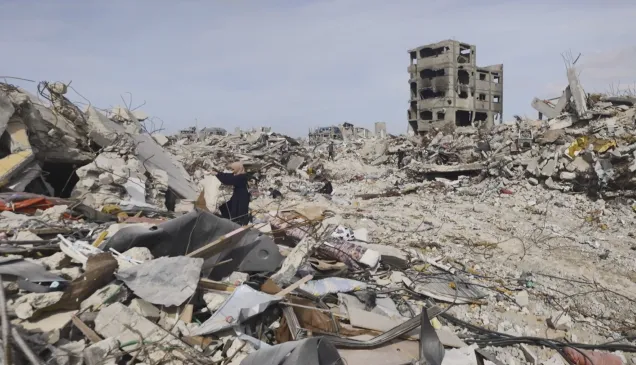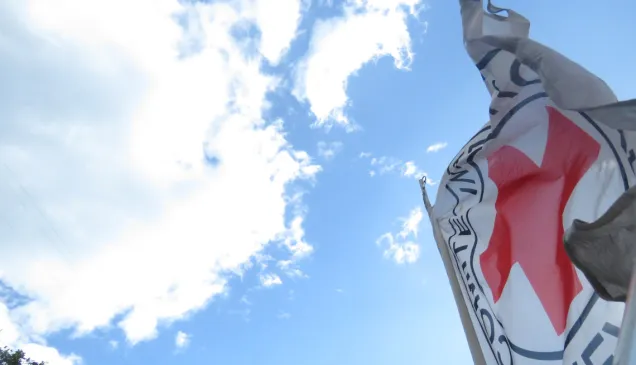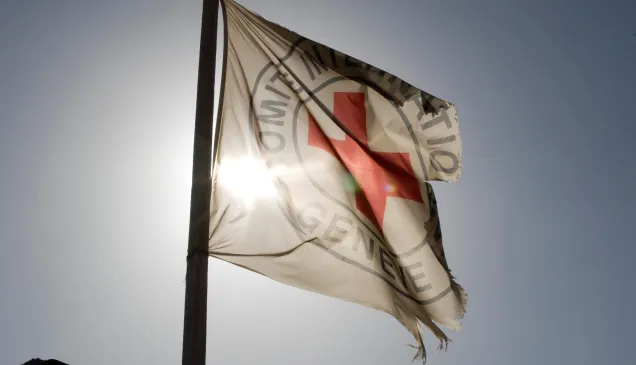ICRC and Lebanese Red Cross action in Lebanon, 1975-2015
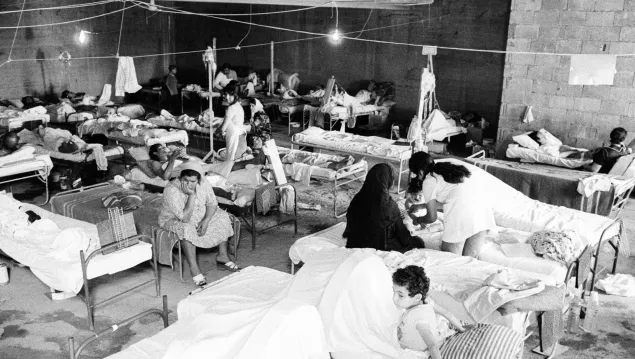
“One day we entered an area of a village that was caught in the middle of very heavy and continuous crossfire and we evacuated three families who had been stuck in their homes for months. After things calmed down, we managed to return the families to their village from Beirut, where they had sought refuge. The reaction of the other villagers when they saw the members of the three families will stay with me forever. They were convinced that these families were among the dead and that they were seeing ghosts, so they ran away. They simply could not believe that anyone could have possibly survived such a long and violent siege.” Janvier De Riedmatten, ICRC delegate.
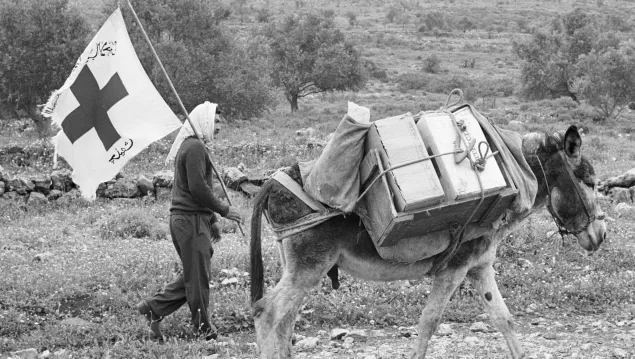
1978. The ICRC’s ‘Donkey Operation,’ transporting food on donkeys to areas across south Lebanon.
“I saw how the donkey moved away from the mine planted by a human being to kill another human being. On that day, I learned to trust animals; however I never lost my faith in humans and humanity. After every emergency operation, strangers who did not know my religion or nationality would hug and kiss me. They only knew that I carry this emblem, which stands for neutrality and impartiality, and for humanity. It taught me that nothing is impossible when helping another person in times of emergency.” Nayla Al Hachem, former ICRC staff member and former head of the Emergency Medical Services of the Lebanese Red Cross.
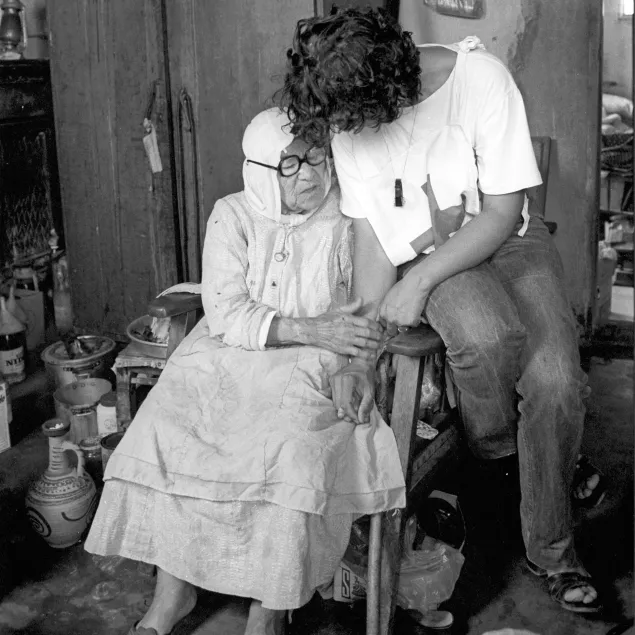
1982. An ICRC delegate speaks with a 102-year-old beneficiary in Beirut.
“It is very difficult to summarize 35 years in a few sentences, but I will try. The faces, smiles and tears of hundreds of families – I am grateful to them for allowing me to share their sadness and their fears. My career and my life could be thus summed up in one word: service.” Christine Rechdane, protection assistant with the ICRC.
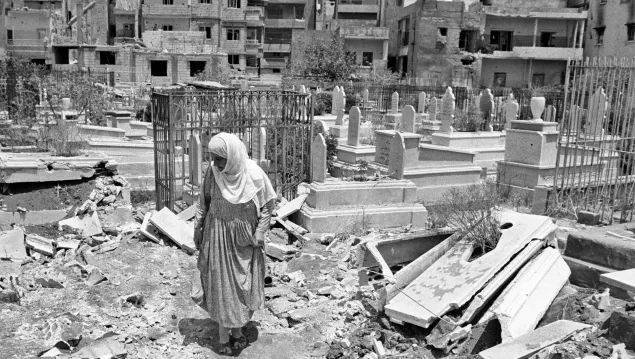
1982. A damaged cemetery in Beirut, Lebanon.
“Red Crescent Societies do not have archives of the war we experienced, so I will comment on this picture that reflects the Palestinian tragedy in general. I am a general physician who acquired surgical skills through practice. I have healed and treated many in Rashidiya camp, but I will never forgive myself for not being able to save the people closest to my heart, my brothers Sobhi and Omar.” Salah Al Ahmad, doctor with the Palestinian Red Crescent Society.
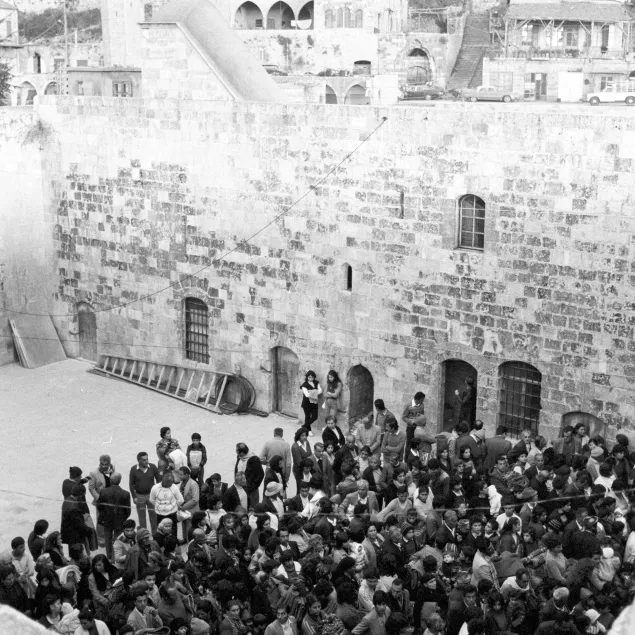
1983. Before the evacuation by the ICRC of civilians from Deir el-Kamar to Beirut.
“I spent 12 years as a volunteer with the Lebanese Red Cross, during which I experienced the war through people’s eyes, and it haunts me still. I remember we were once in Deir Al Amar transferring civilians to Dekwaneh and an old man asked ‘how will you protect us without arms?’ I answered enthusiastically, ‘the emblem is our protector,’ to which he replied in a resigned tone, ‘even artillery couldn’t protect us in these circumstances.’ After we arrived safely in Beirut, he declared, “I guess the emblem really can protect us.’ That day I didn’t reply out of any real belief, but today I am sure that only the emblem can protect us in time of war.” Dimyanos Kattar, Former Lebanese Finance Minister.
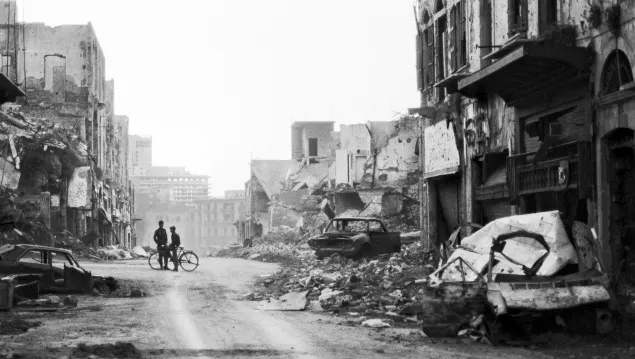
1983. Destroyed neighbourhoods in Beirut, Lebanon.
“When war fails to steal the children’s happiness, you find them running towards their bikes at a time of truce to ride around their city. They do not care why their city is destroyed, they only want the truce to last a while longer so the fun won't end. Beirut was not destroyed in 2008, but it was empty. I would wait for rounds of violence to stop before going out to regain some of my life. But that didn’t happen. In that mini-war, my friends took to the front lines, fighting other Lebanese. This time, the war stole my friends; they became combatants.” Maytham Kassir, relative of a missing person and journalist with Al-Arabiya.
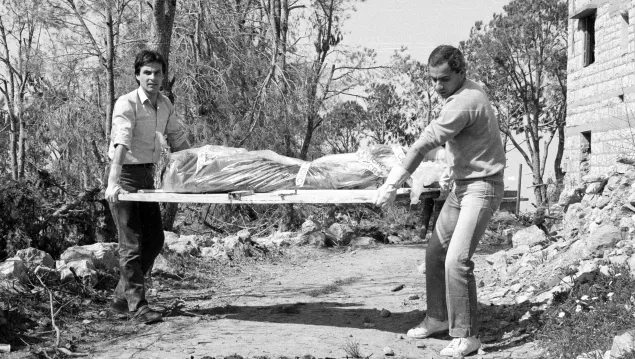
1984. The ICRC transfers the bodies of Lebanese soldiers in Beirut.
“You can read about wars and massacres, but reality is different; it is much harder. You get to a point where you cannot stop crying for people you do not know, people whose lives you do not know. The suffering cannot be explained and can only be understood by those who have been through it. War is an ugly thing. It still scares me to this day.” Imad Tabash, former ICRC staff member.
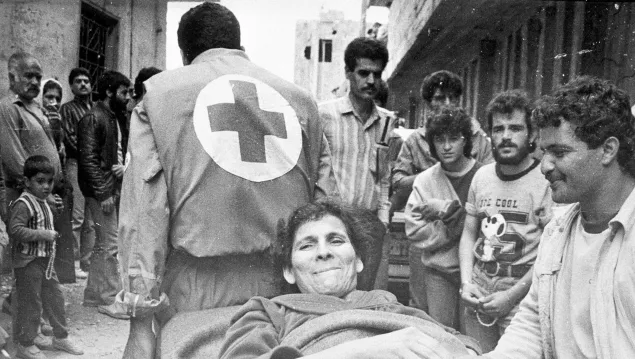
1987. Evacuating civilians in Bourj Al Barajneh camp, Beirut.
“I volunteered with the Lebanese Red Cross when I was 17 years old. The day I applied, I had to lie about my age in order to be recruited as a volunteer during the war. I used to lie to my parents about my whereabouts to keep them from worrying. One of my most memorable moments was when I negotiated a ceasefire between armed groups and proceeded to move the dead and wounded for three hours straight. I never cried at the time of the incidents. But when I got home and thought of the things that I had seen, I wept. I am enraged when our ambulances and volunteers are targeted. I am at my happiest when I know that all of our volunteers have made it back safely to their centres. But my ultimate happiness is and will always be the moment I know that a life has been saved.” Georges Kettaneh, Secretary General of the Lebanese Red Cross.
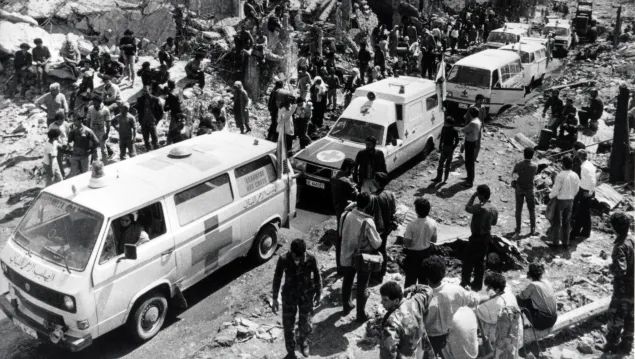
1987. The Lebanese Red Cross and the ICRC evacuate civilians from Chatila refugee camp in Beirut.
“My memory has become random and selective. I cannot summarize my 37 years of work with the ICRC. All of my memories are on paper, not in my mind. They are like flashing lights – some are bright, others are dark. Indeed, some are bright! It’s true that war is a painful time, but helping people whoever they may be and wherever they are is a bitter-sweet feeling.” Farouk Taleb, car pool manager at the ICRC.
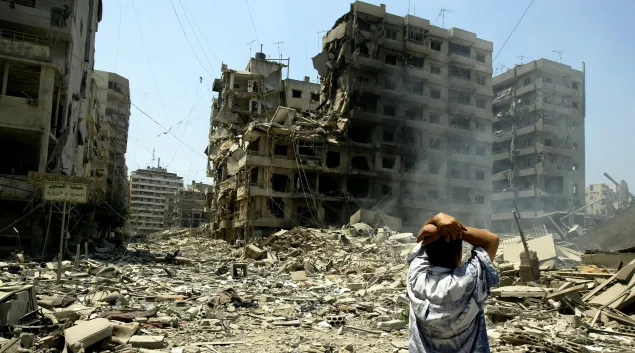
2006. Despair at the sight of the large-scale destruction of Beirut’s suburbs.
Ryad Dbouk, an ICRC field officer based in Tyre, south Lebanon, described the July 2006 conflict as “one of the most destructive and brutal of wars; all the infrastructure and electrical networks were targeted.” In this photo, an man screams his pain and despair at seeing what is left of his home and neighbourhood in the south of Beirut after the destructive air strikes.
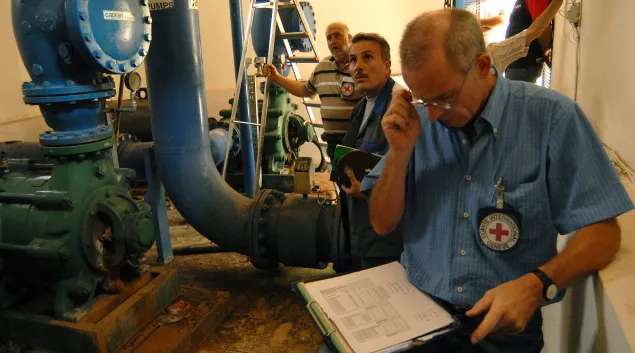
2006. Repairing water networks following the end of the July 2006 war.
ICRC engineers, responding to the urgent need for water in south Lebanon, work with various authorities to repair damaged reservoirs and pipes and set up mobile tanks. Once repaired, the water networks would provide water to thousands of people through 160 km of pipes.
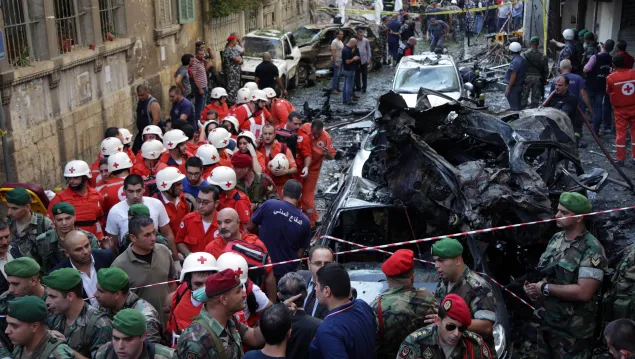
2012. Following an explosion in Beirut's Ashrafieh neighbourhood.
“They were very similar to me, around the same age. They had wedding rings on their fingers and pictures of their children in their wallets. Someone was waiting for them at home. They belong in the arms of their loved ones, not there where I found them, their remains scattered after an explosion that made no sense.” Wassim Rida, Lebanese Red Cross volunteer.
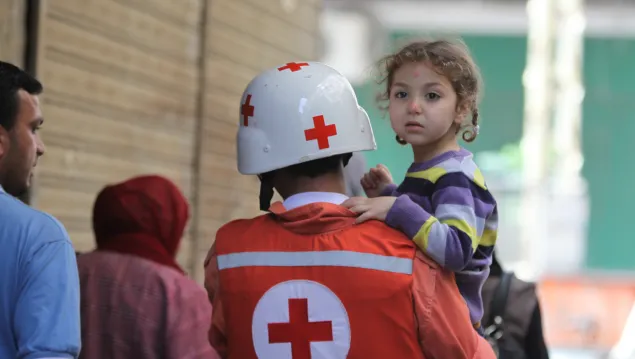
2012. A Lebanese Red Cross volunteer evacuates a little girl during one of several rounds of violence that hit Lebanon’s northern city, Tripoli.
When asked about his journey with the Lebanese Red Cross after nine years of voluntary service, Nayef takes from his wallet an old, folded page from the nespaper Assafir. The picture accompanying the news article shows him with a little girl in his arms. It looks like he is flying. His feet are not touching the ground. He says: “The little girl had wet herself from fear. She wasn’t the only one who was scared, I was scared too. We all are when we’re on duty. Fear is our most important defence mechanism. At second glance, it seems that I’m running with extreme speed, as if I’m floating between the army and combatants, but today when I look back at this picture and what happened, I am floating with happiness because I saved that child.” Nayef Chehade, Lebanese Red Cross volunteer and head of the Lebanese Red Cross Tripoli centre.
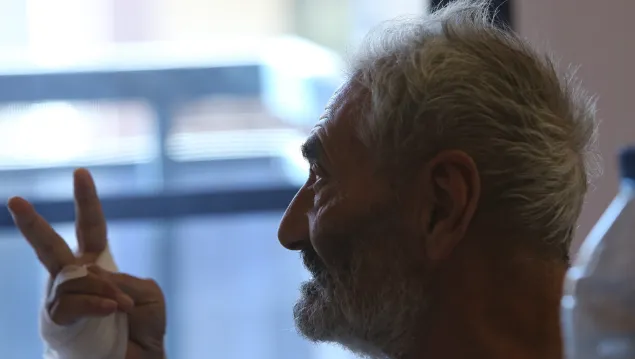
2014 A Syrian man receives treatment at the ICRC’s WTTC hospital in Tripoli.
Mohammad, wounded by shelling in Syria, holds up two fingers. For a brief moment, you think he might be making the victory sign, but Mohammad is talking about his two children, left under the rubble of his home in Syria, along with his spectacles. But he does not need his glasses to see that victims are victims, regardless of victory or loss during war.
These photos are part of an audiovisual exhibition entitled "Echoes," organized by the Lebanese Red Cross and the ICRC to commemorate 40 years since the Lebanese war and 40 years of humanitarian action. The exhibition will run from 16 to 26 April in Villa Paradiso, Gemmayzeh, Beirut.

